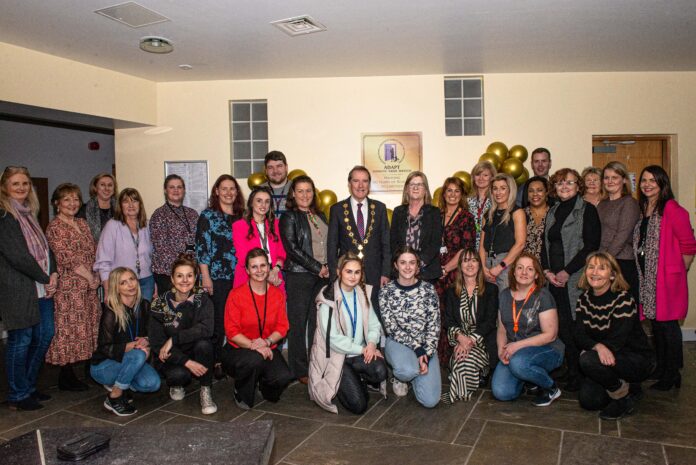
IN THE early 1970s, 15 pioneering ladies got together in Limerick to talk about the needs of women in contemporary Ireland. Most of them were students of a philosophy course.
This group of women decided to form an association to help deserted parents, and from this ADAPT was born. The visionary women set up a weekly drop-in service in the Social Services Centre on Henry Street.
It soon became clear that the majority of women attending the service had experienced domestic abuse, with many having no other option but to remain in the home. There was nowhere else to go and no laws to protect them.
The growing group set about fundraising, lobbying, and actively campaigning to open a refuge.
In 1976, they opened the doors of Limerick’s first refuge in the old City Dispensary in Lower Gerald Griffin Street. The building had six bedrooms, two bathrooms, a small shared kitchen, and an office that doubled up as a meeting room.
50 years later, the service has supported thousands of women and their children.
“The women who get support from ADAPT are all survivors – their experiences of domestic abuse are shocking, their strength and strategies to survive it are remarkable,” ADAPT director Denise Dunne told the Limerick Post.
ADAPT now has a refuge with 15 self-contained apartments, all fully equipped and decorated to generate a feeling of calmness, safety, and welcome.
Some women stay in the refuge and return home, some go on to build a new life.
“The outcome is not the main concern – what is important is that they had the courage to look for support,” said Denise.
‘Why doesn’t she leave the relationship?’ is often asked by family members, friends, and even from trained professionals. By asking this question, Denise says, society creates additional barriers for women who need to leave.
“This question increases their fear of being judged, of being seen as a ‘bad’ mother, or of somehow being responsible for what is happening to her, when she is doing nothing wrong and is the victim of a crime. For some women it is not safe to leave”.
Over the past 50 years, legislation has been introduced to support victims of domestic abuse and coercive control. Collaborations are established with local community groups and statutory agencies.
“These collaborations are essential in supporting the Third National Strategy, which calls for zero tolerance for domestic, sexual, and gender-based violence in society,” the ADAPT director said.
“For the future, we hope for a society where domestic abuse and coercive control are not tolerated, where perpetrators are held accountable for their actions, and where women and children can live their lives safely and free from abuse”.










